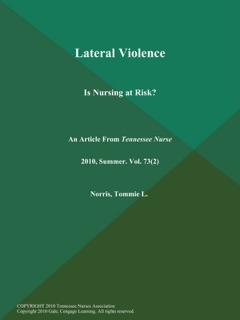Lateral violence is the act of threatening, humiliating, or actually inflicting physical, mental or emotional harm on a peer or group. Bullying, profanity, and sexual harassment may come to mind when mentioning lateral violence. But these are not the only ways that lateral violence may manifest itself in personal interactions. Condescending language, impatience with questions from novice nurses or unlicensed personnel, belittling, rudeness, withholding information, and even temper tantrums are considered forms of lateral violence. Violence may be perpetuated by peers, providers or even by patients and their families. It is important to note that student nurses, novice nurses (those entering the profession), and even experienced nurses may be at risk for lateral violence. Nursing is not immune to the devastating trend of increasing workplace violence. Individuals may be attracted to the field of nursing because of its reputation for being the most trusted profession; however, the reputation of nursing is at jeopardy since nurses are more at risk for workplace violence than other professions (Carter, 2000). In fact, nursing is four times more dangerous than most other professions (Gallant-Roman, 2008). Nurses provide care for disgruntled patients and families, those who are mentally or emotionally unstable, and those who are violent criminals. Nurses must also interact with peers and other health care providers within the workplace who evoke fear and anxiety. Lateral or horizontal violence in health care has become so prevalent and troublesome that The Joint Commission (2008) has established a standard that all hospitals and organizations must determine what constitutes inappropriate behavior and develop a process to deal with this behavior. Sadly, Sincox and Fitzpatrick (2008) report research by Griffin (2006) that found 60 percent of new nurses leave their first position within six months of employment due to some form of lateral violence targeted against them in the workplace. How many times have we heard gossiping in the lounge such as, "Sally, the new nurse we just hired, asked me how to calculate the correct dosage based on the patient's weight. I can't believe she is so unprepared." The "hazing of novice nurses" is unacceptable.





